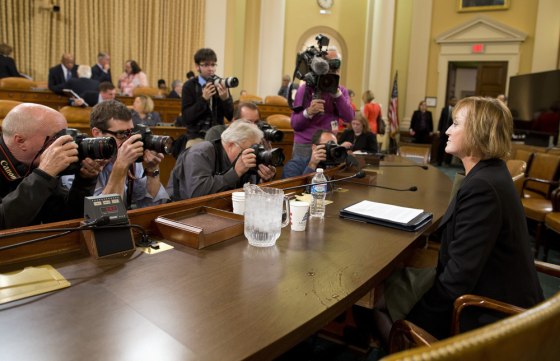The head of the agency running the troubled federal government health insurance website apologized for the website's problems Tuesday, promising they will be fixed.
But Centers for Medicare and Medicaid Services administrator Marilyn Tavenner insisted the website, the crowning glory of 2010 Affordable Care Act, was working and would eventually work better.
“I want to apologize to you that the website has not worked as well as it should,” Tavenner said. "This healthcare.gov site is fixable," she added. "The system is working. It's just not working as smoothly and consistently as we want."
Tavenner’s boss, Health and Human Services Secretary Kathleen Sebelius, made similar promises for a quick fix in written testimony submitted to the House Energy and Commerce Committee, where she was scheduled to testify Wednesday.
“The initial consumer experience of HealthCare.gov has not lived up to the expectations of the American people and is not acceptable. We are committed to fixing these problems as soon as possible,” Sebelius wrote. The administration has promised the site will work smoothly by the end of November.
Later Tuesday, HHS officials detailed some of the recent fixes in a blog post. "We can now process nearly 17,000 account registrants per hour – or five per second – with an error rate near zero," it reads.
"We replaced the virtual database with a high-capacity physical one, which allowed more efficient, effective processing and significantly reduced the error rate, or account registration failures," it adds. Technicians also doubled the number of servers and made the database more efficient, they said.
"We pushed through a patch release with four software fixes to address users that were having a hard time logging in to their accounts," the blog added.
Members of the House Ways and Means Committee demanded to know why Americans should trust that the troubled website, or even the entire health care law, will ever work.
“While the website can eventually be fixed, the widespread problems of Obamacare cannot,” panel chairman Dave Camp, a Michigan Republican, said. “These problems can’t be fixed through a tech surge.”
House Republicans, who did not vote to pass the 2010 Affordable Care Act and who have voted more than 40 times to repeal it, say they won't stop trying. "There is no way to fix this monstrosity, said House Speaker John Boehner (R-OH). "We want to repeal Obamacare and replace it with patient-centered health care."
Texas Republican Kevin Brady asked Tavenner why the site wasn't ready sooner. "You have had nearly four years to get it ready," Brady said. "Why should the American people believe you now?"
Tavenner said technicians had added capacity to the website, and that experts were tackling glitches one by one. "That is the gradual improvement you will see over the next four weeks, and that is why we are confident," she said.
Sebelius blamed the contractors. “CMS has a track record of successfully overseeing the many contractors our programs depend on to function. Unfortunately, a subset of those contracts for HealthCare.gov have not met expectations,” she said in her written testimony for Wednesday.
One of the contractors who failed was Virginia-based CGI, Tavenner said. Last week, CGI said the site was tested in the last two weeks before launch when months would have been better.
Brady said he doubted government could ever manage something as complex as healthcare. "The flaw is not in the website," he said. "The flaw is in the law itself." Later, he added: “The clock is ticking on a website that is broken. My constituents are scared.”
Tavenner pushed back against allegations that the administration misled people about whether they could keep health plans they liked, saying any canceled plans were scrapped by insurers who knew they were not meeting the law's requirements.
“Some insurance companies have decided that they want to offer new plans and if they offer new plans they have to come under the requirements of the Affordable Care Act,” she said. This includes providing 10 “essential benefits” such as free cancer screening, as well as covering people even if their care starts to get very expensive. “You can’t be denied, you can’t be kicked off a policy,” Tavenner said.
